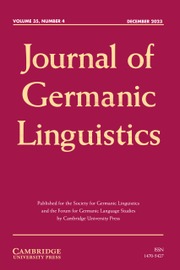Article contents
EPISTEMIC MODALITY AND TENSE IN GERMAN
Published online by Cambridge University Press: 23 May 2002
Abstract
This study investigates why an epistemic interpretation of modal verbs is possible only in the present or preterit, not in the perfect. Epistemic modals are argued to be predicates of propositions; they are not associated with a time variable and therefore cannot be tensed. The tense in which an epistemic modal appears is either a pleonastic tense or a tense determined by the discourse context. This analysis, unlike the analyses provided by Diewald (1993), Zifonun et al. (1997), and Wurmbrand (1998), automatically predicts the scope of temporal adverbials in sentences with modals. It also has implications for two additional issues related to the study of modal verbs: the classification of evidential modals and the grammaticalization of modals.I would like to thank a number of people for their help in various ways with this article (for serving as native informants, for providing language data and valuable references, and for helpful discussion): Susanna Bauer, Byron W. Bender, Amy Dahlstrom, Wolfgang Ertl, Gert Webelhuth, Ann S. Wilke, and Werner W. Wilke. Thanks also to anonymous JGL reviewers for their comments and suggestions on an earlier draft.
- Type
- Research Article
- Information
- Copyright
- © 2001 Cambridge University Press
- 4
- Cited by




